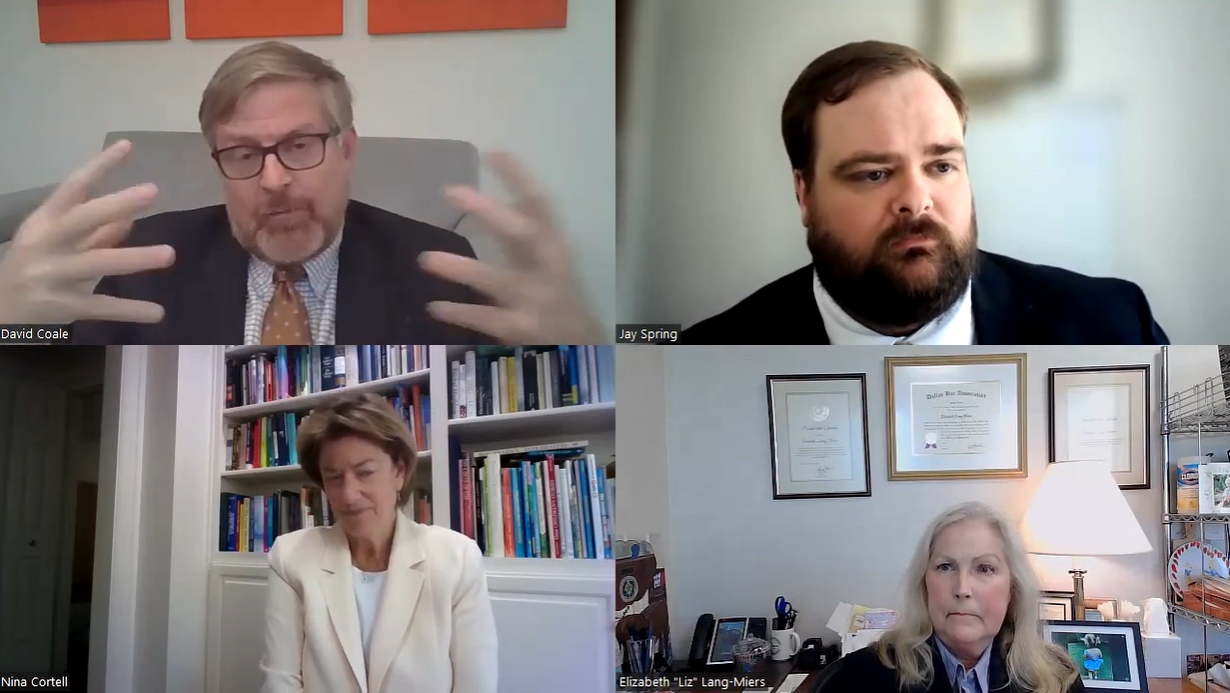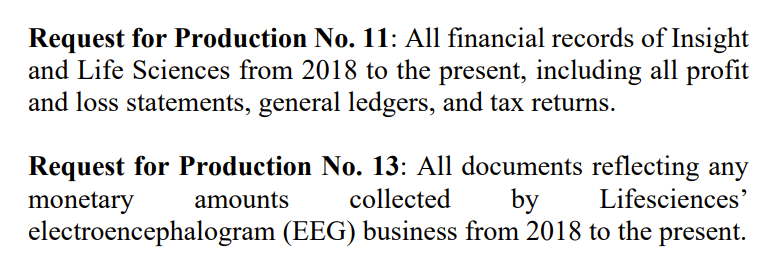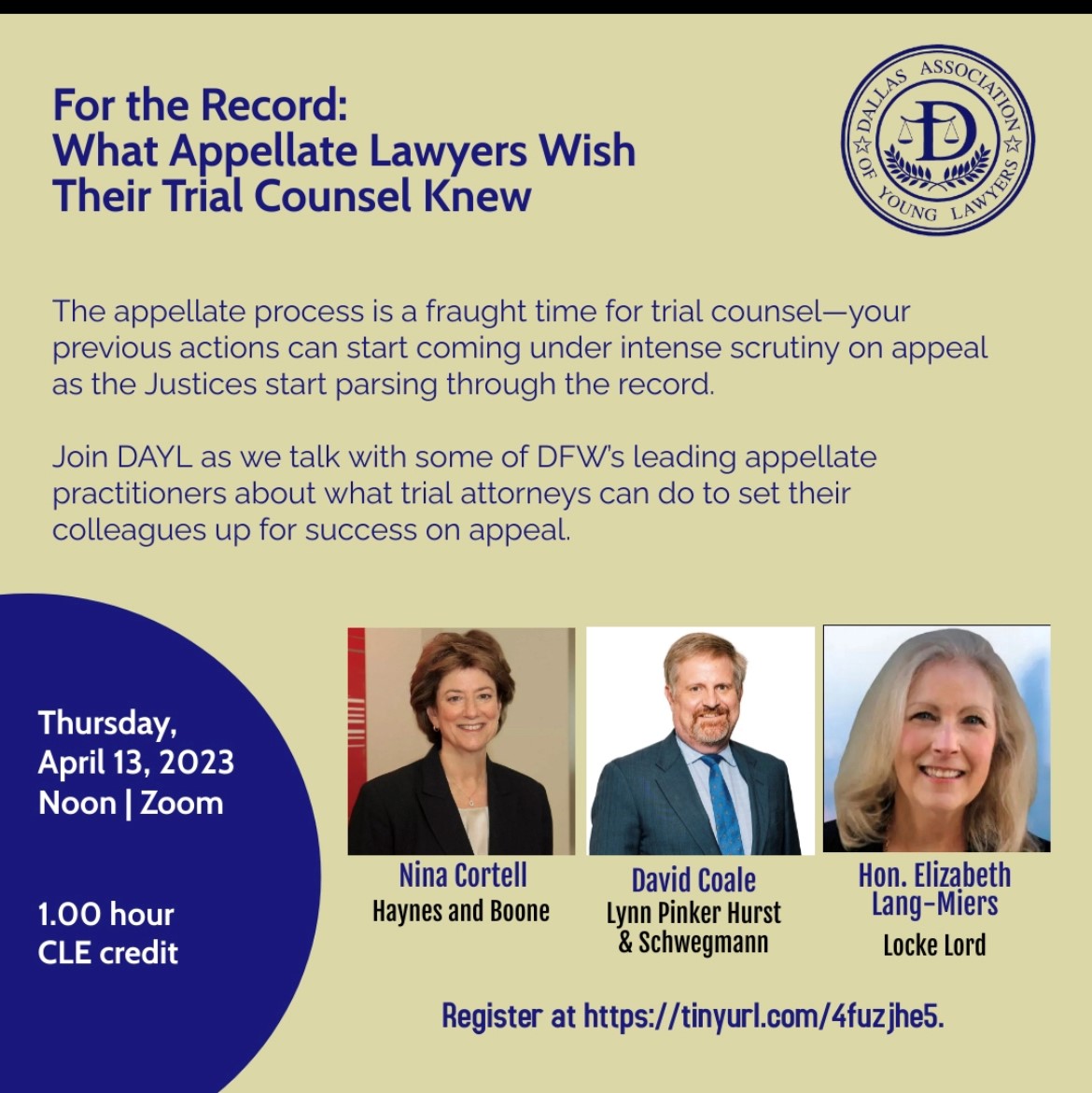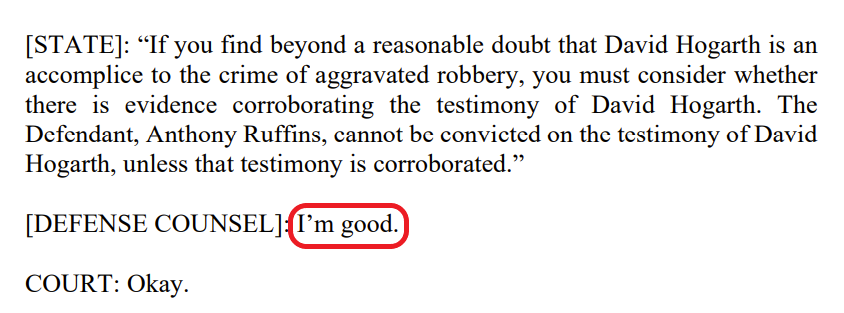The “anti-fracturing” rule is a powerful principle for professional-liability litigation in Texas. Under the rule, “Texas courts do not allow plaintiffs to convert what are really negligence claims into claims for fraud, breach of contract, breach of fiduciary duty, or violation of the DTPA.” But the rule is constrained by the facts, and the Fifth Court reversed a summary judgment when, inter alia, “[t]he focus of the breach of fiduciary duty claim was on conduct other than the preparation of the [financial statements] and beyond the duty of ordinary care owed to [the accounting firm’s clients] regarding the preparation of those documents.” Rivas v. Pitts, No. 05-21-00876-CV (April 25, 2023) (mem. op.).
Monthly Archives: April 2023
i had an op-ed in yesterday’s Dallas Morning News about the proposal for a new 15th Court of Appeals as part of a new “business courts” system for civil litigation.
 Monkedia, a Texas-based LLC, loaned $40,000 to Sevenly, a business based in North Carolina. Monkedia sued Sevenly in Texas when a payment dispute arose, and the Fifth Court reversed the denial of Sevenly’s special appearance in Sevenly Outfitters LLC v. Monkedia LLC.
Monkedia, a Texas-based LLC, loaned $40,000 to Sevenly, a business based in North Carolina. Monkedia sued Sevenly in Texas when a payment dispute arose, and the Fifth Court reversed the denial of Sevenly’s special appearance in Sevenly Outfitters LLC v. Monkedia LLC.
The Fifth Court summarized the law in this area as follows:
- Yes jurisdiction: “[T]he courts of appeals of this state have generally found a nonresident defendant purposefully avails itself of this forum when it contracts with a Texas resident as a result of its solicitation of the Texas resident,” citing a 2017 First Court opinion about a similar interstate loan transaction.
- No jurisdiction: “When the solicitation runs the other way and the plaintiff solicits business with the nonresident defendant, we have concluded there was no specific jurisdiction over the nonresident defendant, even though the defendant made payments to Texas under a contract that includes a Texas choice of law provision.”
- Also no jurisdiction: “[W]hen the record is silent as to which party solicited the others business, courts have found the defendant did not purposefully avail itself of the forum.”
Accordingly, Texas courts lacked jurisdiction over Sevenly. While the reocrd showed some communications between the parties that involved Texas, “[a]bsent in the record … is any allegation or evidence showing that Sevenly solicited Monkedia’s business or that Monkedia was engaged by Sevenly to market Sevenly’s products to Texas customers.” No. 05-22-00096-CV (April 19, 2023) (mem. op.).
In re Redbird Trails Apts involved a mandamus petition, presented after the trial court conducted an in camera review of certain documents, and determined that none of them were relevant.
Citing Tex. R. App. P. 52.7, the Fifth Court noted: “Relators’ burden is to provide this Court with a sufficient record for mandamus review. … This burden requires them ‘to request that any documents submitted to the trial court for in camera inspection be carried forward under seal so that the appellate court can evaluate this information.'”
The Court then held: “Here, the mandamus record does not include the records inspected by the trial court in camera, and nothing before us reflects that relators have asked the trial court to carry the documents forward to this Court under seal. We are unable to assess the merits of the petition without them.” Accordingly, it denied the petition. No. 05-23-00332-CV (April 17, 2023) (mem. op.).
 If you missed it, fear not! The CLE panel that I was on last week for DAYL is now on Zoom for your enjoyment and self-study CLE credit.
If you missed it, fear not! The CLE panel that I was on last week for DAYL is now on Zoom for your enjoyment and self-study CLE credit.
 The Fifth Court granted mandamus relief as to a TRO requiring a law firm to make certain files available to a former firm attorney. It focused on this language in the TRO:
The Fifth Court granted mandamus relief as to a TRO requiring a law firm to make certain files available to a former firm attorney. It focused on this language in the TRO:
The Court further finds that Plaintiff has demonstrated she and the clients at issue will suffer imminent, irreparable, and extreme injury if the requested relief is not awarded by the Court. Specifically, Plaintiff has demonstrated that she – and the clients – will suffer imminent, irreparable harm for which there is no adequate remedy at law.
And the Court held:
The temporary restraining order … does not provide a nexus between the actions compelled (requiring PJD to give Cheek access to, and allow her to copy, all client files for clients she represented) and an irreparable injury to Cheek. The order merely recites the conclusory statement that Cheek would suffer immediate, irreparable harm for which there is no adequate remedy at law.
In re PJD Law Firm, PLLC, No. 05-23-00012-CV (April 11, 2023) (mem. op.) (applying, inter alia, El Tacaso, Inc. v. Jireh Star, Inc., 356 S.W.3d 740 (Tex. App.–Dallas 2011, no pet)).
The peititoners for mandamus relief in In re Vega Street 1, LLC argued that the trial court had failed to render judgment in a matter. The Fifth Court saw matters otherwise. Reminding that “an appellate court may not deal with disputed areas of fact in an original mandamus proceeding,” it held:
Here, the record shows respondent provided a path to obtain a judgment by requesting that relators provide a proposed judgment to her. The record contains emails showing that relators e-mailed proposed judgments to respondent at her official e-mail address for her consideration. However, in her response, respondent stated that she had not received the proposed judgments. And the record does not contain file-stamped copies of any proposed judgments. Under these circumstances, we cannot conclude the record conclusively shows respondent actually received the proposed judgments or that she has refused to rule on the motion for judgment.
No. 05-23-00160-CV (April 12, 2023) (mem. op.).
I’m part of a fun online CLE tomorrow April 13 at noon sponsored by the Dallas Association of Young Lawyers, about “what appellate lawyers wish trial counsel knew.” You can register here on the DAYL website.
The Fifth Court affirmed a $3 million fraud judgment, rendered after a bench trial, reaching these conclusions:
- This choice-of-law provision did not encompass a fraud claim that did not involve construction of the referenced LLC agreeement: “This LLC Agreement shall be governed by and construed and interpreted in accordance with the laws of the State of Delaware, without regard to any principles of conflicts of law that would result in the application of the laws of any other jurisdiction.”
- For similar reasons, Texas tort law applied in a Restatement-based choice-of-law analysis.
- Sufficient evidence supported fraud liability when “BKSI disclosed certain facts to ECOM regarding the Promenade Project’s status and operating condition, creating the false impression that it intended to continue operating the project as a long-term investment, and thus obligated BKSI to disclose the ‘whole truth’ concerning the project, specifically the approaching sale of the project to Madera.”
BK Series Investors, LLC v. ECOM Series Investors, LLC, No. 05-22-00115-CV (Apr. 7, 2023) (mem. op.).
In In re Insight Neurodiagnostics, LLC, the Fifth Court granted mandamus relief as to these discovery requests:
 In the underlying litigation, Jones contended that he had been undercompensated by his employer. The Court concluded that these requests by him were overly broad:
In the underlying litigation, Jones contended that he had been undercompensated by his employer. The Court concluded that these requests by him were overly broad:
- “These requests could cover financial information that does not involved Jones,” and
- “The requests are impermissibly broad because they extend into a time period during which Jones did not work with [defendants].”
The court further observed: “The burden to propound discovery complying with the rules of the discovery should be on the party propounding the discovery, and not on the courts to redraft overly broad discovery so that, as re-drawn by the court, the requests comply with hte discovery rules.” No. 05-23-00014-CV (April 5, 2023) (mem. op.) (citation omitted).
The trial court ordered an increase in juror pay from the usual $40/day to $250/day, to be paid by the plaintiff. The Fifth Court granted mandamus relief against this order; describing a statutory problem and a broader, systemic concern.
- Statute. Tex. Gov’t Code § 61.001 says: “In a specific case, the presiding judge, with the agreement of the parties inovled or their attorneys, may increase the daily amount” paid for jury service; which increase “shall be paid, in equal amounts by the parties involved in the case.” This order was not consistent with this statute.
- Broader systemic concern. The plaintiff invoked the court’s inherent power, but the Fifth Court noted that the state constitution expressly places this issue under legislative control. Jurors are considered “officers of the court,” and art. III § 4 of the constitution says: “The Legislature shall provide by law for the compensation of all officers, servants, agents and public contractors, not provided for in this Constitution … .”
In re Oncor Elec. Deliv. Co., No. 05-23-00298-CV (March 31, 2023) (mem. op.).
 As a companion to the Fifth Court’s recent opinion in Aflalo v. Harris, which addressed a home seller’s damages when the contract price exceeded the market price, the Texas Supreme Court recently decided MSW Corpus Christi Landfill, Ltd. v. Gulley-Hurst, LLC, which involved the opposite situation:
As a companion to the Fifth Court’s recent opinion in Aflalo v. Harris, which addressed a home seller’s damages when the contract price exceeded the market price, the Texas Supreme Court recently decided MSW Corpus Christi Landfill, Ltd. v. Gulley-Hurst, LLC, which involved the opposite situation:
“When the property’s market value at the time of breach exceeds the contract price, the correct measure of benefit of the bargan damages is the difference between the promised contract price and what the seller received.
No. 21-1021 (Tex. March 24, 2023) (per curiam) (emphasis in original).
The Fifth Court found an abuse of discretion by not reinstating a case after a DWOP, (a matter evaluated under the same standard as “conscious indifference” under Craddock), stating:
The record of the hearing on the motion to reinstate shows the Weldas’ counsel relied on the trial court’s statement at a pretrial hearing that “you probably won’t get reached” on the day of trial to explain his failure to appear at the October 6 trial. Thus, counsel’s testimony established he mistakenly believed that trial would not proceed on October 6 and thus failed to appear for trial. When an explanation is reasonable, as we have here, a trial court abuses its discretion in failing to reinstate. Under these circumstances, we conclude the trial court abused its discretion in allowing the Weldas’ motion to reinstate to be overruled by operation of law.
Welda v. Mangavalli, No. 05-21-00145-CV (March 23, 2023) (mem. op.).
The concept of estoppel is recognized by modern Texas law in many distinct doctrines: quasi-estoppel, equitable estoppel, judicial estoppel, etc. And sometimes, just saying the right words at the right time creates an estoppel, as occurred in a recent Texas Court of Criminal Appeals opinion where this exchange occurred about a key jury instruction:
Held: “The record reflects Appellant specifically asked the trial court to ensure that the jury be instructed they had to agree ‘beyond a reasonable doubt’ that Hogarth was an accomplice. We hold that Appellant, once he stated ‘I’m good’ with the instruction, is estopped from thereafter claiming that the instruction was improper.” Ruffins v. State, No. PD-0862-10 (Tex. Crim. App. March 29, 2023). I thank my friend Doug Gladden, a keen observer of Texas criminal law, for drawing this case to my attention.


